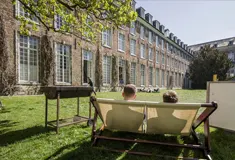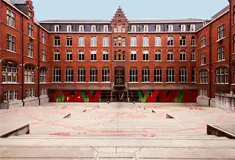
Sitting right in the heart of Europe, Belgium is wonderfully diverse and would be a fantastic choice for any international student. Known for its high quality of life, healthcare and education, the country ranks as one of the safest and most peaceful countries in the world.
Belgium is a country that can offer a fantastic study abroad experience to any international student. Its location within Europe means that you will have easy access to the rest of the continent and all it has to offer. The country shares land borders with France, Luxembourg, Germany and the Netherlands.
Belgium uses the Bologna Process and ECTS, as it is a European country. This means that your qualifications will be recognised throughout Europe, which is useful for any further studies or future employment.
Belgium is an incredibly global country, and is the home of the European Union (EU) and the North Atlantic Treaty Organisation (NATO). Because these organisations are headquartered there, the country is also a political hub.
The climate in Belgium is relatively mild, you would experience warm summers and colder winters. There are plenty of opportunities to enjoy the green spaces and gorgeous scenery throughout all four seasons.
There are many exciting cities in Belgium, with plenty of them being incredibly popular with students from all over the world. The most popular of these cities include the capital Brussels, Antwerp, Ghent and Bruges.
| Continent | Europe |
|---|---|
| Language(s) of tuition | English, Dutch, French, German |
| Universities on StudyLink | 11 universities |
| Major Student Cities | Brussels (capital), Antwerp, Bruges, Ghent |
Advanced Bachelor of Bioinformatics at home Advanced Diploma, Bachelor Degree
Howest University of Applied Sciences Belgium
Find out moreApplying to a Belgian university as an international student is pretty simple. You can apply to each university you are interested in, most of them have an online application portal of some kind. You will be required to pay an application fee for each university, which will vary.
Common admission requirements for universities in Belgium include:
You might be required to have any documents translated into Flemish, French or German, depending on which university you are applying to.
More information about applying to study at Belgian universities can be found on our Degrees and Masters in Belgium pages.
Belgium uses the Euro (€) as its currency.
Tuition fees at Belgian universities will vary depending on where you are from, and what type of university you choose to study at. EU/EEA students pay a lower tuition fee than international students from other countries.
The Belgian education system is also more complex than other European countries, as it is split into 2 communities: the French community and the Flemish community. You can find out more about this on our Universities in Belgium page.
On average, you should expect a bachelors or masters degree to cost between €1,000 and €15,000 per year. Specialised degrees, such as medical, veterinary or dentistry programs, will be on the more expensive end of the spectrum.
There are scholarships available for international students. These are offered by universities and other private organisations, such as banks. It is important to research the funding options available to you before you apply to any Belgian universities.
Your living costs will depend on where you choose to live in Belgium. KU Leuven recommends that you budget for €1,000 to €1,350 per month. Their estimate includes all of the basic needs, such as rent, bills (heating, water, electricity, etc.), food, laundry, insurance, and other leisure and transport costs. You will be required to provide proof of funding when applying for a visa.
Another living cost that you will need to consider is health insurance. If you are an EHIC card holder then you will be able to access healthcare in the same way as Belgian citizens. If you are from an EU country and do not hold an EHIC card, you should check that you are eligible and apply for one before you move to Belgium.
If you do not or cannot have an EHIC card, you will need to purchase health insurance for the duration of your stay in Belgium. If you already have a health insurance policy for your home country, check if it is valid in Belgium before purchasing a new policy, as this could save you time and money.
If you are an international student wanting to study in Belgium, you may be required to obtain a valid student visa. If you are from an EU/EEA country (including Switzerland), you are exempt from visa requirements. If you are from any other country, you will need to apply for a long stay visa.
For more information about student visas and how to apply as an international student, see our Belgium Student Visa Guide.
Belgium has three official languages; Dutch (Flemish), French and German.
Whilst there are courses taught in all of these languages, the majority are offered in French. There is an increasing number of programs offered in the English language, especially at postgraduate level.
If you are applying for a course taught in any of the official languages of Belgium, you will need to have advanced language skills, and be able to pass language proficiency tests. If you are applying for a course taught in English, you will also need to pass an English language test, the most common ones are IELTS and TOEFL.
These tests will make sure that your language skills will meet the required standards for learning. It is common for institutions to offer courses to improve your language skills if you are not able to pass proficiency tests.

KU Leuven, Leuven

Vlerick Business School, Ghent
Sign up to StudyLink.com, the home of quality study abroad advice.
Sign up now